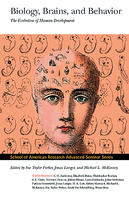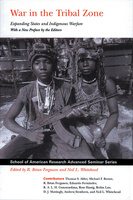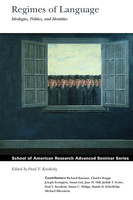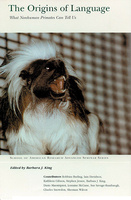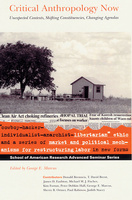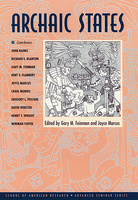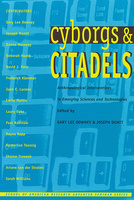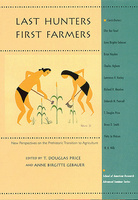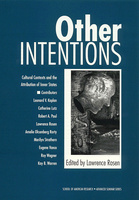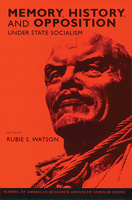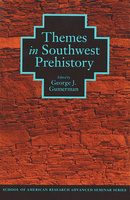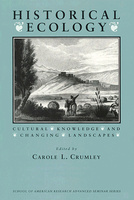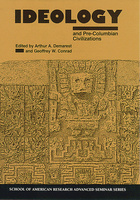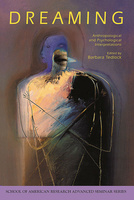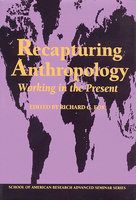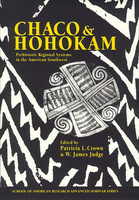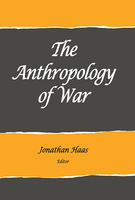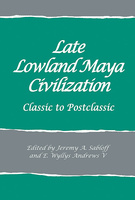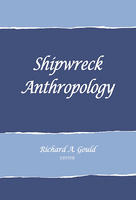Biology, Brains, and Behavior
The Evolution of Human Development
An exciting new cross-disciplinary field of biocultural research is emerging at the start of the twenty-first century: developmental evolutionary biology.
War in the Tribal Zone
Expanding States and Indigenous Warfare
War in the Tribal Zone, the 1991 anthropology of war classic, is back in print with a new preface by the editors. Their timely and insightful essay examines the occurrence of ethnic conflict and violence in the decade since the idea of the "tribal zone" originally was formulated.
Regimes of Language
Ideologies, Polities, and Identities
In Regimes of Language, ten leading linguistic anthropologists integrate two often segregated domains: politics (without language) and language (without politics). Their essays contribute to an understanding of the role of language ideologies and discursive practices in state formation, nationalism, and the maintenance of ethnic groups, on the one hand, and in the creation of national, ethnic, and professional identities, on the other.
The Origins of Language
What Nonhuman Primates Can Tell Us
In The Origins of Language, ten primatologists and paleoanthropologists conduct a comprehensive examination of the nonhuman primate data, discussing different views of what language is and suggesting how the primatological perspective can be used to fashion more rigorous theories of language origins and evolution.
Critical Anthropology Now
Unexpected Contexts, Shifting Constituencies, Changing Agendas
Building on the legacy of Writing Culture, Critical Anthropology Now vividly represents the changing nature of anthropological research practice, demonstrating how new and more complicated locations of research-from the boardrooms of multinational corporations to the chat rooms of the Internet-are giving rise to shifts in the character of fieldwork and fieldworker.
Archaic States
One of the most challenging problems facing contemporary archaeology concerns the operation and diversity of ancient states. This volume addresses how ancient states were structured and how they operated, an understanding of which is key to our ability to interpret a state's rise or fall.
Cyborgs and Citadels
Anthropological Interventions in Emerging Sciences and Technologies
Some of the country's most influential thinkers use anthropological methods and theories to examine the practices and practitioners of contemporary science, technology, and medicine in the United States. The authors explore such questions as how science gains authority to direct truth practices, the boundaries between humans and machines, and how science, technology, and medicine contribute to the fashioning of selves.
Senses of Place
The complex relationship of people to places has come under increasing scholarly scrutiny in recent years as acute global conditions of exile, displacement, and inflamed borders-to say nothing of struggles by indigenous peoples and cultural minorities for ancestral homelands, land rights, and retention of sacred places-have brought the political question of place into sharp focus.
Last Hunters, First Farmers
New Perspectives on the Prehistoric Transition to Agriculture
In case studies ranging from the Far East to the American Southwest, the authors of Last Hunters-First Farmers provide a global perspective on contemporary research into the origins of agriculture. Downplaying more traditional explanations of the turn to agriculture, such as the influence of marginal environments and population pressures, the authors emphasize instead the importance of the resource-rich areas in which agriculture began, the complex social organizations already in place, the role of sedentism, and, in some locales, the advent of economic intensification and competition.
Other Intentions
Cultural Contexts and the Attribution of Inner States
The authors argue that although intentionality might appear to be a wholly abstract phenomenon, it is deeply entwined with the nature and distribution of power, the portrayal of events, the assessment of personhood, the interplay of trust and deception, and the assessment of moral and legal responsibility.
Memory, History, and Opposition under State Socialism
Eight anthropologists, sociologists, and historians probe the oppositional narratives created by Chinese rural intellectuals, èmigrè Croats, and organized dissenters such as the Djilas of Yugoslavia who constructed and maintained oppositional histories in state socialist societies.
Themes in Southwest Prehistory
Two dozen leading archaeologists isolate a number of themes that were central to the process of increasing complexity in prehistoric Southwestern society, including increased food production, a greater degree of sedentism, and a dramatically increasing population.
Historical Ecology
Cultural Knowledge and Changing Landscapes
Environmental change is one of the most pressing problems facing the world community. In this volume, the authors take a critical step toward establishing a new environmental science by deconstructing the traditional culture/nature dichotomy and placing human/environmental interaction at the center of any new attempts to deal with global environmental change.
Ideology and Pre-Columbian Civilizations
Employing data from central Mexico, the Maya area, coastal Peru, and highland Peru and Bolivia, directors of several major archaeological field projects interpret evidence of prehistoric ideology and address the question, has ideology any relevance in the reconstruction of prehistory?
Dreaming
Anthropological and Psychological Interpretations
The ten contributors to this book-anthropologists and psychologists-explore the ways in which dreams are remembered, recounted, shared (or not shared), interpreted, and used by people from New Guinea to the Andes. The authors take a major step toward moving the study of dreaming from the margins to the mainstream of anthropological thought.
Recapturing Anthropology
Working in the Present
The ten papers in this volume offer different versions of how and where anthropologists might work usefully in today's world, converging on the issue of how anthropology can best recapture the progressive character its basic concepts, such as "culture," once had.
Chaco and Hohokam
Prehistoric Regional Systems in the American Southwest
Synthesizing data and current thought about the regional systems of the Chacoans and the Hohokam, eleven archaeologists examine settlement patterns, subsistence economy, social organization, and trade, shedding new light on two of the most sophisticated cultures of the prehistoric Southwest.
The Anthropology of War
This edited collection contains important new material on the origins and role of warfare in “tribal� societies. The chapters focus on a number of basic research issues, including war and social evolution, causes of war, ideology of war, and European transformation of indigenous warfare patterns.
Late Lowland Maya Civilization
Classic to Postclassic
This book is a series of essays that offers a framework for the study of lowland Maya settlement patterns, surveying the range of interpretive ideas about ancient Maya remains. Suggesting hypotheses to guide future research, the articles discuss historical, geographical, chronological, and theoretical matters.
Shipwreck Anthropology
"Shipwrecks are part of the legitimate domain of anthropology and can produce results that are as significant for our ability to explain variability in human behavior as any other kind of archaeology, whether it deals with stone tools in a European Paleolithic rockshelter or ceramics contained in a sixteenth-century Spanish shipwreck." So argues Richard A. Gould, the editor of this volume originating from a 1981 School of American Research advanced seminar.

